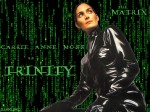It’s not news that I am a huge sci-fi-fantasy-comic-book-alternate-universe story freak. I was watching The Matrix (for possibly the 30th time) the other day when I had a narrative epiphany. Or maybe an epiphany about narratives. Speculative fiction video narratives, to be exact.
Stories have to end sooner or later, in some kind of satisfactory manner – or else the things that excited it us (What do the machines want? Are those people dead? What is the Matrix? What is the Island?) will just start piling up and pissing us off. So. How do you end it? How do you tell interesting stories – in worlds that must be explained – without either burying the viewers with WAY too much technical information, or else short-changing them?
Different story tellers make different choices. Those who are truly successful balance the world building, character exposition and plot perfectly – so we get most of our questions answered, and give a shit about the characters they happened to. I believe this is more difficult in a story in which one must convince the viewer that the world itself exists, in addition to believable characters and a plot that is both interesting and surprising (but not too).
The Matrix Trilogy vs. Lost
Both were very successful out of the gate. Both were very ambitious. Both asked all kinds of interesting questions and answered a few of them in the beginning. Both had a huge following.
And both of them had a huge portion of their followers HATE the way they ended.
In the Matrix story (I’m sticking to just the three films, here. I know there’s a lot more info in Animatrix and the games and whatnot, but the major thread is contained in the films), the writers/directors chose to explain everything they could: the Oracle, the Core, the Architect, Zion, the machines… on and on and on. An entire cosmology and ideology and history and everything. They knew this world inside and out and they shared it with us. And a lot of people (not me) thought it was boring and lame and too complicated. Like you had to take notes just to understand what was going on. And the characters are not terribly complicated. Good guys and girls, bad guys and girls. Boy loves girl, gets girl. Sketched in histories, lots of emotion but not too much depth. In the choice between plot and character, the Wachowski Brothers chose plot. It works well in the first flick, and by the third flick it’s clear that plot is what must sustain us. For many, it was not enough. Or maybe too much – plot, that is, and not enough character. Time restrictions play a factor here – how long can the film be? (IMHO, their worst mistake – horrible recast of the Oracle. I know the original actress died, but they did a crappy job of choosing her replacement. Ack!)
In Lost, the TV series, Abrams and Lindelhof et.al., chose character over plot. We get histories, alternate futures, heavy interactions and lots of ambiguity. Sawyer: good guy or bad guy? Kate: bad girl or good girl? Who are the Others? And the other Others? They built a compelling but barely explicated cosmology that sacrificed detail for emotional impact. And some people HATED it. How did the smoke monster work, exactly? Were they dead the whole time? Why wasn’t Mr. Eko in the church at the end? For those who cared more about character, the ending was great (at that point, all I cared about was Sawyer and Juliet being reunited). I don’t need to know why pulling that strange stone plug out of a pool underground made the smoke monster mortal. It did, that’s what mattered. For those who wanted to KNOW, they had more questions at the end than ever.
So:
End of Matrix – finally! Who cares if it was the machines or the Architect or whatever. The humans lived. Good. Moving on.
End of Lost – What?! So were they dead? Were they dreaming? So was the island real? Did they die in the first plane crash? What about the smoke monster? Have you ever hated anyone as much as Benjamin Linus?
If you don’t get the balance just right, you will leave half your fan base angry and unsatisfied.
Many successful science fiction movies are set in the future – far enough away that you should expect for things not to make sense to your poor, feeble 21-century brain. With something like the Matrix, you have to explain why the world looks like ours but isn’t, and how it’s going to end, but it’s already ended 5 times before, but this time it’s different. Lost had six years and two timelines of strange happenings, and chooses not to give many details on most of them. But we know A LOT about Jack, and Kate, and Sawyer and Hurley and Mr. Eko and Sayid and Juliet and Ben and Locke and everyone else.
Comic books (and regular book series as well) have the luxury of drawing out the universe, painting it and describing it and making it real and believable and understandable, for years and years and pages and pages, without the obligation to tie all the loose ends or finish every sub plot at the end of each book/year/story arc/what-have-you. It can create a place, pose 10 questions, answer 3 of them, and then continue on, asking more questions and answering a few here and there. This freedom from deadline (at least in theory) is part of the reason it is hard to quit reading them. One story may end, but the universe is still there, having other stories being told all over it.
Okay, so I don’t know exactly what it all means. But it seemed interesting. To me, at least. I wouldn’t presume to speak for all of you.
Bonus epiphany: theme of both Lost & Matrix = Love conquers all. Okay, so it’s a common theme. So what? It just occurred to me, so that makes it a super-amazing realization. And probably the reason I liked both of them. Well, that and cute boys.

